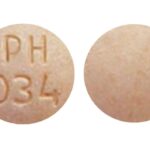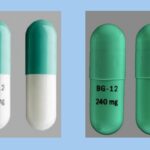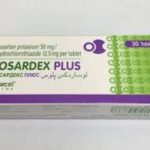A 03 Pills: Uses, Dosage, Side Effects, Interactions

The pink, round pill with the imprint A 03 has been identified as Simvastatin 40 mg supplied by Aurobindo Pharma. A 03 Simvastatin pill is used together with diet, weight-loss, and exercise to reduce the risk of heart attack and stroke and to decrease the chance that heart surgery will be needed in people who have heart disease or who are at risk of developing heart disease. Simvastatin is also used to decrease the amount of fatty substances such as low-density lipoprotein (LDL) cholesterol (”bad cholesterol”) and triglycerides in the blood and to increase the amount of high-density lipoprotein (HDL) cholesterol (”good cholesterol”) in the blood.
A 03 pills may also be used to decrease the amount of cholesterol and other fatty substances in the blood in children and teenagers 10 to 17 years of age who have familial heterozygous hypercholesterolemia (an inherited condition in which cholesterol cannot be removed from the body normally). Simvastatin is in a class of medications called HMG-CoA reductase inhibitors (statins). It works by slowing the production of cholesterol in the body to decrease the amount of cholesterol that may build up on the walls of the arteries and block blood flow to the heart, brain, and other parts of the body.
Accumulation of cholesterol and fats along the walls of your arteries (a process known as atherosclerosis) decreases blood flow and, therefore, the oxygen supply to your heart, brain, and other parts of your body. Lowering your blood level of cholesterol and fats with simvastatin has been shown to prevent heart disease, angina (chest pain), strokes, and heart attacks.
How should I take A 03 pills?
A 03 pills are usually taken once a day in the evening. Take A 03 pills at around the same time every day. Follow the directions on your prescription label carefully, and ask your doctor or pharmacist to explain any part you do not understand. Take A 03 pills exactly as directed. Do not take more or less of it or take it more often than prescribed by your doctor. Your doctor may start you on a low dose of simvastatin and gradually increase your dose, not more than once every 4 weeks.
Continue to take A 03 pills even if you feel well. Do not stop taking A 03 pills without talking to your doctor.
What are the side effects of A 03 Simvastatin pills?
A 03 pills doesn’t cause drowsiness, but it can cause other side effects.
More common side effects
The more common side effects that can occur with simvastatin include:
• headache
• nausea
• stomach pain
• constipation
• muscle pain or weakness
• joint pain
• upper respiratory infections
Serious side effects
Call your doctor right away if you have serious side effects. Call 911 if your symptoms feel life threatening or if you think you’re having a medical emergency. Serious side effects and their symptoms can include the following:
• rhabdomyolysis (muscle breakdown)
• severe muscle pain or weakness
• muscle pain or weakness that does not go away when this drug is stopped
• muscle spasms
• kidney failure
• liver toxicity
• jaundice (yellowing of the skin)
• severe anemia
• severe allergic reaction, with symptoms such as fever and trouble breathing
• rash of any kind
• extreme sensitivity to the sun
• diarrhea
• feeling weak or very tired
• severe stomach pain
• severe nausea or vomiting
• severe swelling of the hands, feet, and ankles
A 03 pills may interact with other medications
A 03 pills can interact with other medications, vitamins, or herbs you may be taking. An interaction is when a substance changes the way a drug works. This can be harmful or prevent the drug from working well.
To help avoid interactions, your doctor should manage all of your medications carefully. Be sure to tell your doctor about all medications, vitamins, or herbs you’re taking. To find out how this drug might interact with something else you’re taking, talk with your doctor or pharmacist.
Examples of drugs that can cause interactions with simvastatin are listed below.
Strong CYP3A4 Inhibitors
These drugs block your body from breaking down simvastatin. This can lead to very high levels of the drug in your body. It can also increase side effects, including rhabdomyolysis.
These drugs should not be used with simvastatin. If treatment with these drugs is required, the use of simvastatin must be on hold during the course of treatment. Examples of these drugs include:
- ketoconazole
- itraconazole
- voriconazole
- posaconazole
- erythromycin
- clarithromycin
- telithromycin
- cyclosporine
- danazol
- nefazodone
- telaprevir
- ritonavir
- tipranavir
- indinavir
- fosamprenavir
- darunavir
- atazanavir
- nelfinavir
- cobicistat
Other cholesterol-lowering drugs
When used with simvastatin, some cholesterol drugs can increase side effects such as myopathy or rhabdomyolysis. If you use these drugs with simvastatin, your doctor may lower your dosage of simvastatin. Examples of these drugs include:
- gemfibrozil
- fenofibrate
- niacin
- lomitapide
With niacin, the risk of myopathy and rhabdomyolysis is higher when the drug is taken in larger doses, and in people of Chinese descent, according to the FDA.
Calcium channel blockers and other drugs that increase risk for myopathy or rhabdomyolysis
Using simvastatin with these drugs can increase the risk of myopathy or rhabdomyolysis. Your doctor may discuss other medication options or lower your dosage of simvastatin. Examples of calcium channel blockers include:
• diltiazem
• verapamil
Do not take more than 10 mg of simvastatin with diltiazem or verapamil, or more than 20 mg of simvastatin with amlodipine.
Other drugs that increase risk of myopathy or rhabdomyolysis include:
• dronedarone
• ranolazine
Heart drug
Digoxin is used to treat heart failure and arrhythmias. Taking simvastatin with digoxin can increase levels of digoxin in your body. If you’re taking both drugs, your doctor may want to monitor your digoxin level more closely.
Gout drug
Colchicine is a drug used to treat gout. Using simvastatin with colchicine can increase the risk of both myopathy and rhabdomyolysis.
Warfarin (blood thinner)
When taken with warfarin, simvastatin can increase the blood-thinning effects of warfarin. This can lead to an increased risk of bleeding. Your doctor monitor your warfarin level more closely if you’re taking these two drugs at the same time.
Simvastatin warnings
This drug comes with several warnings.
Alcohol warning
People with a history of alcohol abuse and risk of liver disease should not take this drug. For people with these conditions, simvastatin can increase the risk of serious liver injury.
Food interaction warning
Avoid grapefruit juice while taking simvastatin. Grapefruit juice can increase simvastatin levels in your body and increase the risk of side effects.
Warnings for people with certain health conditions
For people with low thyroid function (hypothyroidism) or diabetes: Simvastatin and other statin drugs can sometimes cause rhabdomyolysis. Having hypothyroidism or diabetes raises your risk for this condition. Other risk factors include:
- being an older adult
- being female
- having kidney disease
- use of drugs that interact with simvastatin
Tell your doctor right away if you experience:
- unexplained muscle weakness or tenderness
- continuous muscle pain
- diarrhea
- fever
- dark-colored urine
For people with liver disease: People with active liver disease, such as cirrhosis or hepatitis, shouldn’t use simvastatin.
Warnings for other groups
For pregnant women: Simvastatin is a category X pregnancy drug. Category X drugs should never be used during pregnancy.
Simvastatin blocks the production of cholesterol, which is important for the developing baby.
If you’re pregnant and need treatment for high cholesterol or triglycerides, talk with your doctor. They can discuss other treatment options during pregnancy.
If you become pregnant while taking this drug, call your doctor right away.
For women who are breastfeeding: It isn’t known if simvastatin enters breast milk. However, because of the risk of severe side effects, this drug shouldn’t be used during breastfeeding. Talk with your doctor about other cholesterol treatment options while breastfeeding.
For people of Chinese descent: The risk of myopathy and rhabdomyolysis is higher when the drug is taken with niacin in larger doses. In addition, according to the FDA, the risk of myopathy is greater in people of Chinese descent. For more information about these risks, talk with your doctor.





